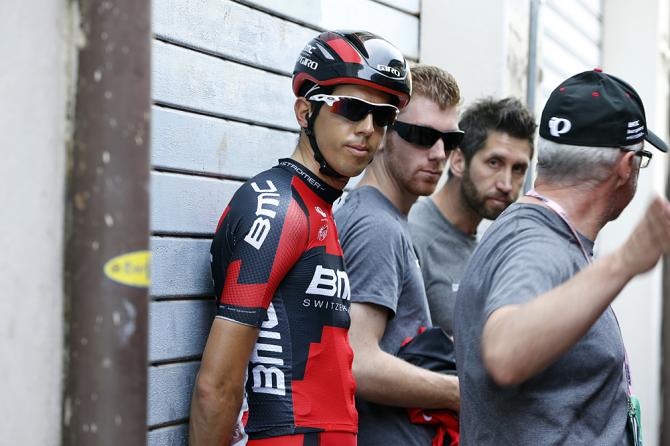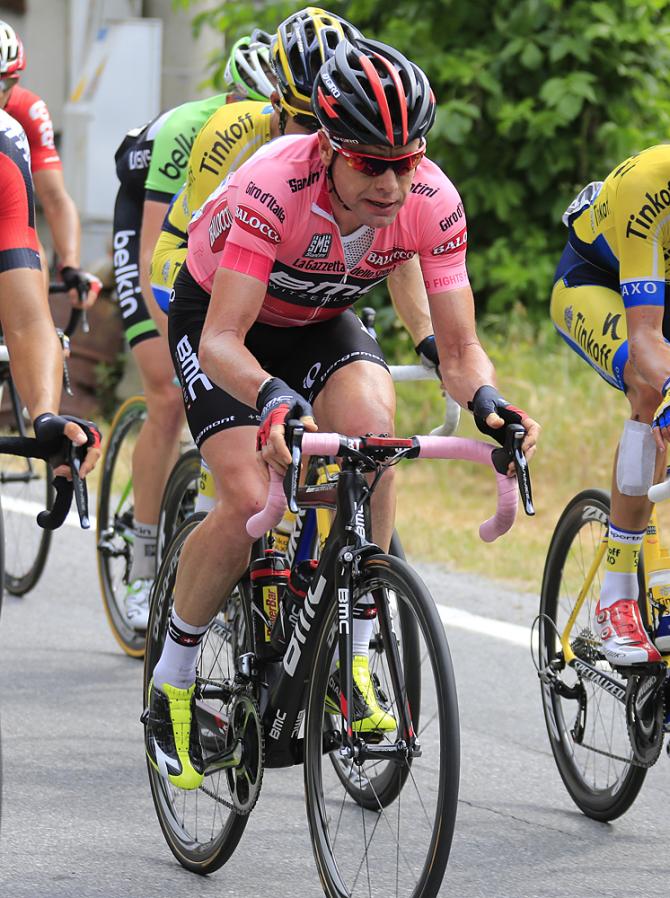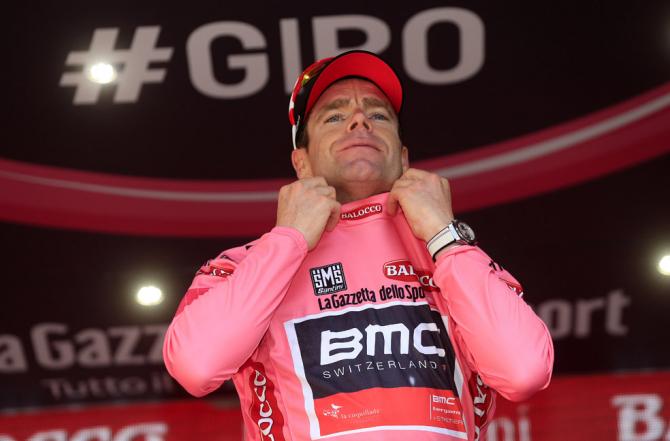Evans faces race of truth at Giro d’Italia
Maglia rosa looks ahead to Barolo time trial



For the first half of the Giro d’Italia, overall contenders deal primarily in the hypothetical. Seconds gained and frittered away during the early exchanges are written off against the expected minutes that will be won and lost as the race reaches its climax.
inCycle video: Cadel Evans' racing profile at the Giro d'Italia 2014
Evans moves into lead of Giro d’Italia on Montecopiolo
Evans maintains overall Giro d'Italia lead at Sestola
BMC and Evans carry weight of race into second week of Giro d'Italia
Pro bike: Cadel Evans' BMC TeamMachine SLR01
Video: Evans avoids trouble as Eijssen's Giro d'Italia comes to an end
Cadel Evans (BMC Racing) has scarcely made an error in the race to date and holds the maglia rosa as a consequence, but the Australian knows that Thursday’s individual time trial from Barbaresco to Barolo marks the beginning of the Giro’s real endgame. The 41.9 kilometre test will be both the most rigorous examination to date of Evans’ credentials and a chance to place a significant down payment on final overall victory.
"I think the time trial is always the race of truth but we’ve had a tough first week and this week. Although we had a rest day and a short stage yesterday, we’ve also had a very long and intense stage today and I think that will have an effect on the performances of everyone in the time trial," Evans said on the eve of the event.
Evans carries a lead of 57 seconds over Rigoberto Uran (Omega Pharma-QuickStep) into the time trial and will be expected to buttress that advantage ahead of the Giro’s entry into the Alps at the weekend. "On paper it’s a course that suits me," Evans agreed.
"It’s more of a rouleur’s time trial and most of the top ten is made up of pure climbers. So maybe it’s slightly more adjusted to me but at this point in the race, recovery is also going to count a lot."
The Barolo time trial was originally slated to take place on a pan flat course, but after consultation with the local organising committee, the route was altered to take the riders on a more demanding course through the picturesque Langhe, the verdant hills immortalised in the writing of Beppe Fenoglio and Cesare Pavese.
Evans reconnoitred the course in December with teammate Steve Morabito. "We had to see it in the station wagon and not on the bike," he quipped, in deference to the course’s location in the heart of Piedmont wine country. The parcours is a difficult one to categorise, although he feels that it bears comparison with last year’s long time trial to Saltara.
The latest race content, interviews, features, reviews and expert buying guides, direct to your inbox!
"It’s got two, three climbs. The first one is a rolling, rolling climb and then the second one is a little bit harder and a bit longer too. Then the last pitch to the line is quite steep," Evans said. "It’s like the time trial we had last year with the steep finish. It’s rolling, hilly and adapted to a climber who can put out power on the flat."
Typically, Evans was coy about the prospects of Nairo Quintana (Movistar) in the time trial. Although Quintana’s form has been an enigma to date, Orica-GreenEdge manager Matt White is among those who feel that the Colombian could surprise many on the road to Barolo.
"I haven’t seen much of Quintana and tomorrow for the time trial I don’t know what to expect. I’ll concentrate on my own result and we’ll see what happens in the results tomorrow," said Evans, who did pointed to two others as possible danger men. "Rigoberto Uran is riding well and is improving day by day, while another name that might be interesting and could do a result is Rafal Majka."
Polemica
The eve of the time trial saw the Giro gruppo make the long, hot trek from Collecchio, across the plain of northern Italy and into the hills of Liguria, with a stage finish in Savona. The seaside town is forever associated with one of the Giro’s most infamous scandals – Eddy Merckx’s positive test and expulsion in 1969 – but this time around there was a more minor polemica to occupy the pink jersey.
Evans’ teammate Steve Morabito was among the fallers in a crash with a shade over 70 kilometres remaining, at a point when Gianni Savio’s Androni-Venezuela team was forcing the pace on the front of the peloton in a bid to set up Franco Pellizotti for stage victory. The pink jersey was given short shrift, however, when he came to the head of the field in person to request that Androni slacken the pace while Morabito rejoined the bunch.
"Androni were riding on the front and there was a crash and I think there was still one rider in the cars and I asked if they would slow down but they said no," Evans said.
The bulk of Evans’ lead over Uran, of course, was picked up on the road to Montecassino on stage 6, when he and Morabito did not relent after their eight-man group managed to avoid the mass crash that shredded the peloton at the foot of the final climb. In his post-stage press conference, Evans was asked to explain the apparent discrepancy between his reactions to the crash at Montecassino and the spill on stage 11.
"When there is a break and there’s a gap of two minutes and it doesn’t affect the result of the race, of course I ask the riders to slow down. But if you’re approaching the finish with the pink jersey and you know slowing down would mean a different kind of result, then it’s a different situation," Evans said, unsheathing his dagger definition of race etiquette.
"As athletes we have to race for a result, that’s our job. It’s in our contract as riders, I think it’s in the contract between the teams and the race organisers, and it’s also the expectation of sponsors. Therefore in the final, when there’s more to lose, only the organisers can stop the race."

Barry Ryan was Head of Features at Cyclingnews. He has covered professional cycling since 2010, reporting from the Tour de France, Giro d’Italia and events from Argentina to Japan. His writing has appeared in The Independent, Procycling and Cycling Plus. He is the author of The Ascent: Sean Kelly, Stephen Roche and the Rise of Irish Cycling’s Golden Generation, published by Gill Books.